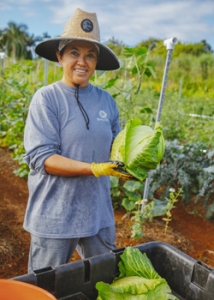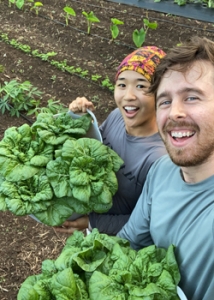American AgCredit (AAC) has pledged $2 million to support GoFarm Hawaiʻi, one of the largest and most successful beginning farmer development programs in the nation. The University of Hawaiʻi at Mānoa College of Tropical Agriculture and Human Resources (CTAHR) program provides business technical assistance, educational opportunities and access to a suite of resources designed to remove barriers to farming and agribusinesses. It also operates five beginning farmer training sites across four islands and an agricultural technician training program at the Waiawa Correctional Facility.
“Food sustainability and economic diversification are key post-pandemic priorities for our state,” UH President David Lassner said. “Many of the GoFarm Hawaiʻi program’s alumni have started independent businesses or secured jobs in the agricultural industry. This strategic philanthropic investment from AAC provides a major boost to our state’s next generation of farmers and our agricultural community statewide.”
The Hawaiʻi 2050 Sustainability Plan has a goal of doubling local food production by 2030.
“Hawaiʻi imports about 85–90% of its food, making it particularly vulnerable to disruptions in food supply,” said CTAHR Dean Nicholas Comerford. “Our GoFarm Hawaiʻi program addresses this by providing farmers with the tools they need to be successful, and expanding our local food supply—a necessity for our entire community.”
National donors

The donation represents the combined contributions of AAC and CoBank, both members of the nationwide Farm Credit System.
“We are thrilled to be able to support the great work GoFarm Hawaiʻi has been doing for nearly 20 years,” AAC President and CEO Curt Hudnutt said. “American AgCredit’s mission, to support all segments of agriculture, is so closely aligned to that of GoFarm Hawaiʻi and this commitment is just a perfect fit for us.”
“Everyone in American agriculture understands the need to grow and develop the next generation of farmers and ranchers,” added Bill Davis, executive vice president of CoBank’s Farm Credit Banking Group. “It is absolutely critical for the industry and for the country as a whole. But for those who don’t come from a farming background, it can be difficult to get started. GoFarm Hawaiʻi has a proven and successful model for engaging beginning farmers and, together with our partners at AAC, we are delighted to be a part of their continued success.”
Diverse local support

GoFarm Hawaiʻi Director Janel Yamamoto added, “We are extremely grateful for American AgCredit and CoBank’s support of our practical training program built around the real-world needs of tomorrow’s farmers. With their support, and the support of other key partners, we can help experienced farmers looking to expand and needing assistance to develop a business plan or proposal, as well as people new to agriculture, wanting to learn the basics of farming.”
The GoFarm Hawaiʻi program is financially supported by competitive grants and private donations. Kamehameha Schools, the Ulupono Initiative, USDA NIFA and the Hawaiʻi Department of Agriculture have been strong supporters of the program since its inception.
Many additional organizations provide access to financial support, land, facilities, contribute labor/time, resources and expertise to support program participants. Program supporters and collaborators include: Kauaʻi Community College; UH Maui College; Corteva Agriscience; CTAHR Cooperative Extension, Hi!Ag Consortium; UH Sea Grant; The Kohala Center; Hawaiʻi Department of Labor and Industrial Relations; Hawaiʻi Department of Public Safety; City and County of Honolulu; County of Hawaiʻi; Kauaʻi County Office of Economic Development; Farm Service Agency; Natural Resource Conservation Service; Hawaiʻi Tourism Authority; Oʻahu Resource Conservation & Development Council; North Shore Economic Vitality Partnership; Farm Link Hawaiʻi; Agricultural Leadership Foundation of Hawaiʻi; Hoʻola Veteran Services; Sustainable Molokaʻi; and the Hawaiʻi Agritourism Association.
This effort is an example of UH Mānoa’s goal of Building a Sustainable and Resilient Campus Environment: Within the Global Sustainability and Climate Resilience Movement (PDF), one of four goals identified in the 2015–25 Strategic Plan (PDF), updated in December 2020.

